Rabbits are adorable creatures and more often they are the first choice for house pets. Same as dogs and cats, it is very important to ensure that our rabbit pets live healthily and fulfilled lives.
Spaying and neutering rabbits, same as for dogs and cats, ensures that they live longer and healthier because it lowers or eliminates the risk of certain cancers such as testicular cancer, ovarian cancer, cancers of the uterus, pyometra, prostate cancer, mammary cancer and more.
When altering a male rabbit you ensure that he will have a more peaceful life because he will no longer have the urge of fighting with other rabbits or cats because of the sexual hormones. Also, unaltered male rabbits will spray around the house just like male cats, and when altered it is easier to litter train them.
Never forget the “overpopulation” issue in which if your rabbit is castrated he will no longer be able to contribute with his offspring. Altered rabbits, especially males, are safer around other animals because without the sexual hormones they will no longer exhibit aggressive behaviors.
When is the right time for rabbit neuter or castration?
Male rabbits can be castrated as soon as their testicles descend, which is at the age of 8-12 weeks.
For females, it is around 4-6 months of age.
As they grow old, surgery and general anesthesia become riskier for rabbits and after they turn 2 all veterinarians should be extra careful when administering anesthetics to rabbits. After the age of 6 is no longer advised to spay or neuter a rabbit.
Altering a rabbit will definitely make his life safer and without the risk of certain cancers and will make your pet less aggressive and more social with other animals.
In the video below, you can watch a rabbit castration.
If you liked this video, watch “Diaphragmatic hernia in dogs” on our blog.


